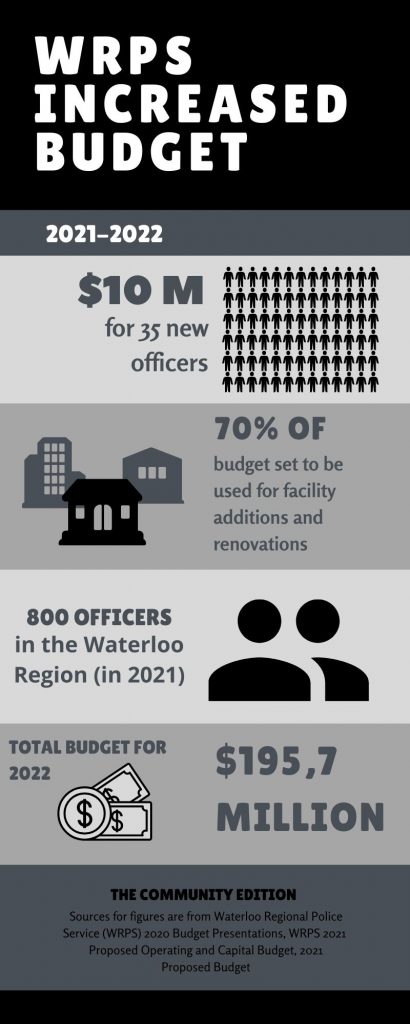By Adrian Quijano

On Dec. 15, 2021, the Region of Waterloo approved a $10 million dollar increase for the Waterloo Regional Police Service (WRPS). The total budget for 2022 comes in at $195, 760, 656 according to CTV News Kitchener Videographer, Colten Wiens. This increase means it will cost the average homeowner in Waterloo an extra $27 in tax money per year. The new budget is $2.4 million less than WRPS’s first proposal, which was initially $12.4 million for 2022. Chief of Police, Bryan Larkin stated this money was mainly meant to hire 35 new officers. The Region of Waterloo approved its 2022 budget on Dec. 15, 2021.
WRPS and the Region of Waterloo have made certain information packages on the matter publicly accessible. The Waterloo Regional Police Service, alongside all other police services in Ontario, must abide by the Ministry of Solicitor General Police Standards Manual. According to these guidelines, the manual is meant to help municipalities and police services understand how to follow the Act and Regulations.
In the Region of Waterloo, the police officer rate per 100,000 population in 2019 was down to 131, a decrease of 1 percent compared to the 2018 rate. This is below the national and provincial rates of 183 and 174 respectively. The WRPS has regularly reported police officers to population rates that are lower than the national average.
In 2019, Waterloo Region had the lowest police officer-to-population rate since 2003 when there were 129.9 officers per 100,000. (Numbers according to Statistics Canada)
On average, there has been an increase of citizen-generated calls from 2010 to 2019, which include: unwanted persons, driving complaints, disputes, disturbances, domestic disputes, suspicious persons, suspicious vehicles, and mental health-related calls for service
The WRPS created a presentation outlining where the 2020 budget was going, and what the proposed 2021 budget increase would go towards. According to this presentation; 99 percent of the WRPS’s budget must be focused on the following requirements under the Police Services Act: law enforcement (76 percent), administration and infrastructure (21 percent), and Emergency and Public Order (2 percent). In 2020, the WRPS’s Ten-Year Capital Budget Forecast was reviewed and approved. This forecast included planned capital improvements or “lifecycle replacement” on existing facilities. As stated in the outline for the 2021 budget increase, most of the money (70 percent) is set to be used for facility additions and renovations.
Additionally, in 2021, the WRPS launched its “Path Forward” project. Its main goal was to restructure the Investigative Services Division. This included Intimate Partners Violence, Special Victims, Youth Protection, Cybercrime, Drug Interdiction, Firearm Violence, Gang and Hate Crime Intervention, and a continued focus supporting victims of property and financial crime. According to the WRPS’ 2021 proposed budget, their main priorities for the year included the Path Forward project, as well as adhering to the Community Safety and Policing Act.
According to the letter, the primary focus of “Path Forward” is addressing systemic racism within policing as well as advancing equity, inclusion, and diversity within the police system. The “Path Forward” project comes in alongside the WRPS’ Equity, Diversity, and Inclusion (EDI) unit. This special unit launched in 2012 and includes police and civilian members from a variety of backgrounds.
Correspondingly, the proposed budget increase was brought to the Waterloo Finance Committee on Jan. 12, 2021. In a letter written to Waterloo Region Chair, Karen Redman from Chief of Police, Bryan Larkin, Larkin wrote:
“Although the financial crisis, social unrest, and the continued impact of the global pandemic has created unprecedented challenges, it has also provided an opportunity for the Police Service to continue to reimagine the future of policing as well as accelerate innovation and learning while continuing self-reflection.”
In the midst of the continuously uncertain environment Waterloo finds itself in, it seems that this budget increase can cause a volley of questions rather than simple answers for the average Waterloo citizen. The Community Edition staff tried to reach out to the WRPS for quotes, but they have opted not to comment.
“But where does the $10 million dollar increase come from? Who’s paying for it? What do all of these numbers mean for the citizens of Waterloo? How will the WRPS be using this money? What are they planning on changing?”
ReAllocate WR is a collective that has been advocating for reinvesting police funds in services dedicated to community care for marginalized peoples. Both Reallocate WR and GroundUp WR teamed up in Nov. 2021 to try and stop the WRPS Budget increase. The two organizations called for the council to “fulfill its commitment of $250, 000 to facilitate community conversations and subsequent actions plans for a police-free community care model,”
“It’s enraging! We do not need more police, they do not prevent crime and are foundationally racist, oppressive, and violent. As an Indigenous person with a criminal record, I am hyper-aware of their [the Police’s] presence, their violence, and their tactics in all the spaces I’m in.” Smoke said. Amy Smoke (they/them) works as the co-founder of Land Back Camp, a member of the Anti-Racism Advisory Working Group for WR, and a grassroots organizer of rallies. They have lived in the Waterloo community for 46 years.
On Nov. 28, 2021, Smoke was a part of the protest against the clearing of a housing encampment in Kitchener. They, alongside many other concerned citizens, spoke out against the criminalization of homelessness and the force which the Waterloo Regional Police service used to clear the camp. During this protest, Smoke was one of the many demonstrators who spoke out against the police budget increase.
“These [police] systems were built so that they can clear the lands for resource extraction and make everything real pretty for that status quo. We need to disrupt those systems. We need to stop allowing colonial enforcement and militarized state violence against people who are just trying to survive on these lands,” Smoke said.

